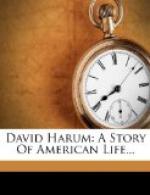“‘Wa’al,’ she says, ‘we don’t know jest yet, but she is quiet now, an’ we’ll hope fer the best. If you want me,’ she says, ’I’ll come any time, night or day, but I must go now. The doctor will stay all night, an’ the nurse will stay till you c’n git some one to take her place,’ an’ she went home, an’,” declared David, “you’ve hearn tell of the ’salt of the earth,’ an’ if that woman wa’n’t more on’t than a hoss c’n draw down hill, the’ ain’t no such thing.”
“Did they live?” asked John after a brief silence, conscious of the bluntness of his question, but curious as to the sequel.
“The child did,” replied David; “not to grow up, but till he was ’twixt six an’ seven; but my wife never left her bed, though she lived three four weeks. She never seemed to take no int’rist in the little feller, nor nothin’ else much; but one day—it was Sunday, long to the last—she seemed a little more chipper ‘n usual. I was settin’ with her, an’ I said to her how much better she seemed to be, tryin’ to chirk her up.
“‘No,’ she says, ‘I ain’t goin’ to live.’
“‘Don’t ye say that,’ I says.
“‘No,’ she says, ‘I ain’t, an’ I don’t care.’
“I didn’t know jest what to say, an’ she spoke agin:
“‘I want to tell you, Dave,’ she says, ‘that you’ve ben good an’ kind to me.’
“‘I’ve tried to,’ I says, ‘an’ Lizy,’ I says, ’I’ll never fergive myself about that bunnit, long ‘s I live.’
“‘That hadn’t really nothin’ to do with it,’ she says, ‘an’ you meant all right, though,’ she says, almost in a whisper, an’ the’ came across her face, not a smile exac’ly, but somethin’ like a little riffle on a piece o’ still water, ’that bunnit was enough to kill most anybody.’”
CHAPTER XL.
John leaned out of the buggy and looked back along the road, as if deeply interested in observing something which had attracted his attention, and David’s face worked oddly for a moment.
Turning south in the direction of the village, they began the descent of a steep hill, and Mr. Harum, careful of loose stones, gave all his attention to his driving. Our friend, respecting his vigilance, forebore to say anything which might distract his attention until they reached level ground, and then, “You never married again?” he queried.
“No,” was, the reply. “My matrymonial experience was ‘brief an’ to the p’int,’ as the sayin’ is.”
“And yet,” urged John, “you were a young man, and I should have supposed——”
“Wa’al,” said David, breaking in and emitting his chuckling laugh, “I allow ‘t mebbe I sometimes thought on’t, an’ once, about ten year after what I ben tellin’ ye, I putty much made up my mind to try another hitch-up. The’ was a woman that I seen quite a good deal of, an’ liked putty well, an’ I had some grounds fer thinkin’ ’t she wouldn’t show me the door if I was to ask her. In fact,




